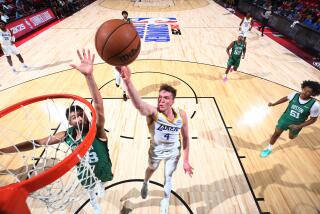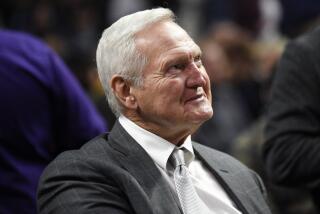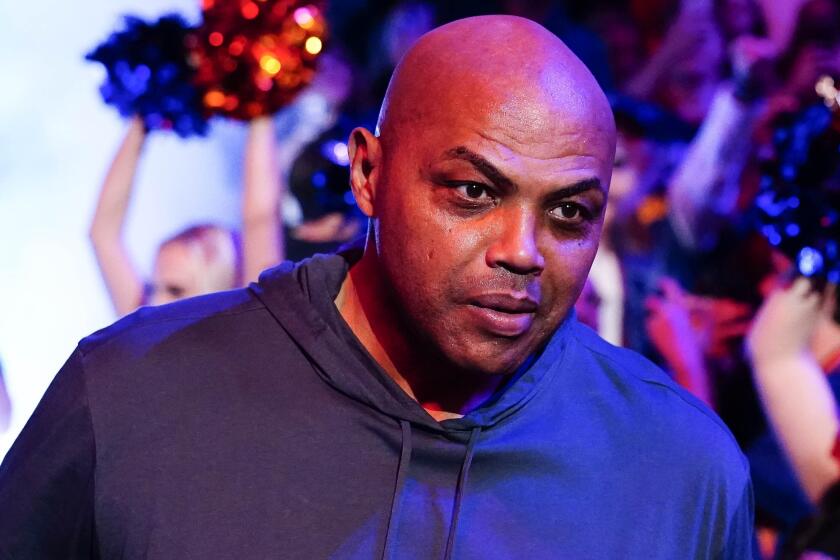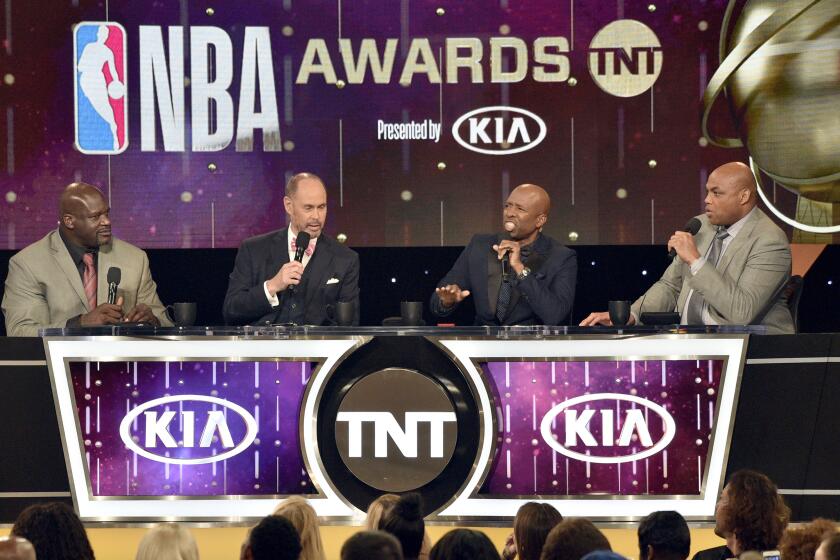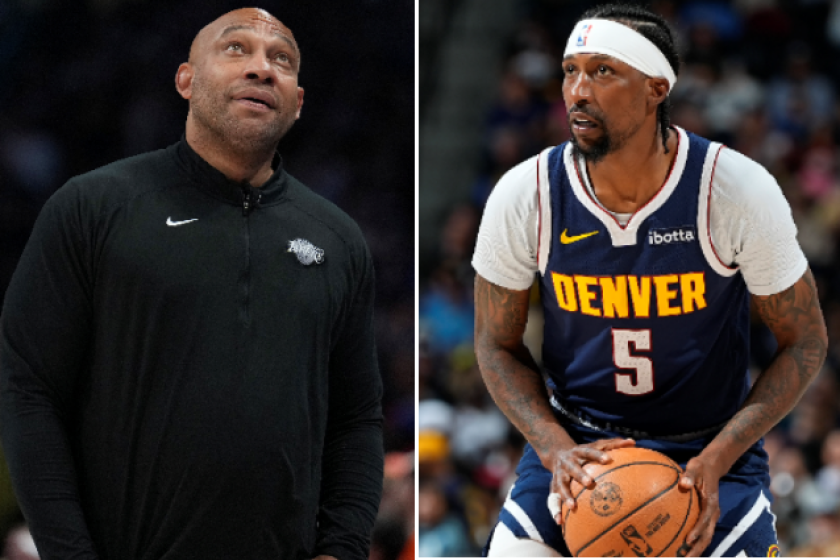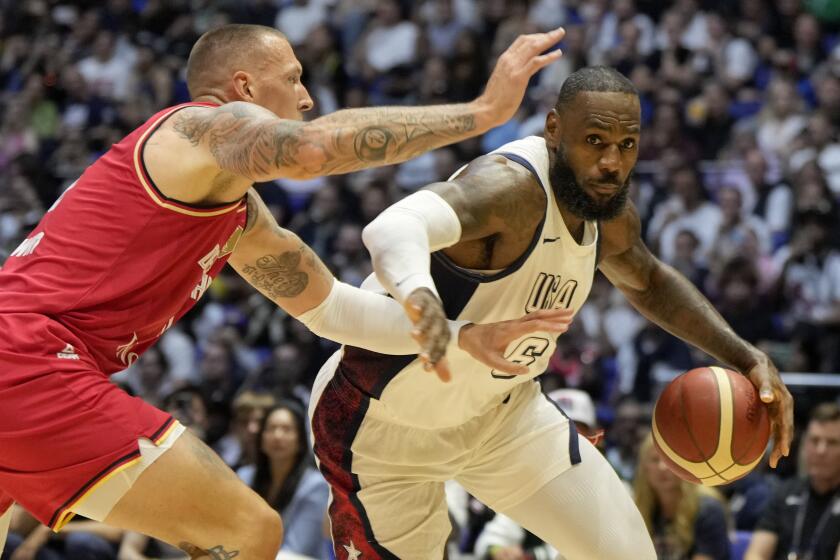REEDEMER, DRAGON, KING OF THE ZING: PHIL JACKSON
It’s a sunny day in Lakerdom in the first year of the reign of Coach Phil Jackson, and nowhere is it brighter than the gated community atop the Santa Monica Mountains where Shaquille O’Neal has the neatest playhouse of any 7-foot, 330-pound kid, with a view, pool, tennis court and Superman logos sculpted into the window panes of the front door. O’Neal is playing the best basketball of his life under a coach who, when hired last summer, knew Shaq only as basketball’s ultimate terror weapon, the giant who never quite achieved his potential. Jackson’s up-close-and-personal introduction came when O’Neal visited the new coach in Montana, and wore out every toy the coach’s now-grown sons had left behind. O’Neal also borrowed a jet ski from Jackson’s neighbor and bounced off the trampoline in Jackson’s yard with such abandon that the coach feared it would collapse.
Great. Jackson was supposed to create the next dynasty around the world’s largest post-adolescent? Nine months later, the Lakers finished the National Basketball Assn.’s regular season with the league’s best record. Jackson had taught the young stars what stardom requires, and he taught the role-players their roles. The team, once young and volatile, is efficient and professional. Kobe Bryant, a mere 21, is growing up on the job. He and O’Neal have reconciled, and O’Neal has become the player opponents always were afraid he might.
Instead of trying to dominate Jackson, as he had all coaches before, O’Neal responded to him, tolerating his unorthodox style. Early in the season, when Shaq was still launching free throws so hard that you were afraid he might break a backboard, Jackson would laugh out loud on the bench, nudging his venerable assistant and mentor, Tex Winter, as if to say, “Did you see that one?” O’Neal noticed. Jackson wanted him to. Amazingly enough, O’Neal held still for it.
Then again, maybe it wasn’t so amazing, seeing as how Shaq had sent out for Jackson last summer as if he were a $30-million corned beef sandwich.
After the Lakers were swept out of the playoffs last spring, O’Neal fled to his summer home in Orlando, skipping the team’s final meeting. The Lakers had lost like that before, and it wasn’t the first meeting Shaq had skipped. In L.A., the Lakers were leaning toward rehiring Kurt Rambis as coach. Since his days as a Laker player, Rambis had been close to the family of team owner Jerry Buss and had taken over coaching duties when Del Harris was fired early in the season. Laker General Manager Jerry West told confidants that this was the Laker way, promoting one of their own. Besides, Buss was not keen on bringing in a high-salary outsider.
Then O’Neal weighed in. “I didn’t really talk to them for a while, but then after it came up--what are we going to do about Kurt and should we look for somebody new?--they asked my opinion.
“I sorta gave the organization an ultimatum,” O’Neal says. “ ‘This is my eighth year. I’m tired of winning 50, 60 games and going home early’ ” after being eliminated in the playoffs, he says he told them. “ ‘ Get me somebody who can take us to the next level.’ ” West and Buss were being too patient, O’Neal says. “But I don’t really believe in patience all the time. I’d rather get it done now.”
O’Neal wanted Jackson, the former New York Knicks player who coached the Chicago Bulls to six NBA championships in the 1990s before retiring. Suddenly, Buss did a 180. With Jackson on a fishing trip with one of his sons in Alaska, the Lakers skipped the interview and went right to the deal, agreeing with Jackson’s agent to pay him an eye-popping $30 million over five years. Jackson, who hadn’t taken a cell phone or a radio, flew out of the wilds to find he was a coach again.
*
Opening night, Nov. 2, 1999, Salt Lake City. This is the new regime? The Lakers have just finished losing five of seven preseason games. Jackson, installing his heralded “triangle” offense, says his players are in “remedial school” or are “autistic,” and he won’t even know what they’ve got ‘til Christmas. “It will be a season,” he tells the Chicago Tribune, “in which I’ll probably be coming to Jerry West’s office and saying , ‘Jerry, there are some guys here who cannot learn what we’re trying to do. . . . We’re going to have to change some personnel to meet the kind of things we have to do. We don’t have a power forward. We don’t have another power player to go along with Shaq.’ ”
The comments aren’t those of a coach just worrying aloud. Jackson knew his arrival in L.A. had generated euphoria among fans and an assumption that the Lakers would dominate. He was now dampening those expectations, a feat in itself for this marquee team with the new arena and the jacked-to-the-moon ticket prices. The basketball world can hardly believe his sleight-of-hand. “Every year, they used to say Del Harris was in trouble if he didn’t win a championship,” grumbles a Western Conference GM. “Now Phil gets a $30-million contract and no one cares if they win a championship?”
Jackson’s comments also demonstrate his clout inside the Laker organization. From the moment he arrived, with those six NBA championship rings, he became the Lakers’ sole spokesman, the guy with the commanding personality who knew what he wanted and how to get it.
In an upset that night, the Lakers, embarrassed often in the Delta Center in recent seasons, hold the Utah Jazz to 84 points and win.
Jackson is usually presented in caricatures: the Knicks’ House Hippie; the Bulls’ Zen-quoting coach, also known as the “Zenmaster”; the Native-American-Artifact-Collecting Spiritual Leader, derided by one current rival, Knicks Coach Jeff Van Gundy, as “Big Chief Triangle.”
The reps grew from his behavior in the peace-and-love ‘60s, from his fondness for Zen and devotion to spiritual beliefs, and perhaps from sportswriters who weren’t accustomed to a player or coach who didn’t fit type. None of the labels do justice. The House Hippie may have come of age in the ‘60s but as a player he had sharp elbows. The Zenmaster has endorsed Cadillacs and currently appears in commercials for a brokerage house.
Although the caricature has endured, Jackson has grown weary enough of it to cut back the shtick in public here. He doesn’t have Native American artifacts on the walls at the practice facility, as he did in Chicago, nor does he make Zen allusions part of his speech. Though he continues to meditate daily and believes in it as a vehicle for finding peace and promoting harmony for himself and his teams, he doesn’t talk about it.
Jackson’s personality is not easy to capture in a phrase, a paragraph or a page. He’s a puzzle you try to work out day by day. In one-on-one interviews, he is gracious, warm and likable, but he does few one-on-ones. He describes himself as “a relatively shy person” who doesn’t “like to draw attention” to himself and yet he couldn’t draw more. He dislikes being recognizable--but loves having a voice and an audience when it comes to the game of basketball. He needs his space--and a lot of it--but has chosen a field in which he is constantly besieged.
He’s dignified before and after games but a snarling dragon during them, incredulous at referees’ calls and unafraid to let his players know what he thinks of their play. He’s always feuding with the NBA hierarchy over who controls what around his team. In the league offices in New York, they dislike him even more than they dislike the arch-controlling Pat Riley of Miami, and Jackson feels as warmly about them.
At the arena, he’s a demon for rules: This is when I’m available. This is when my players are available. This is where you belong and where you don’t. I don’t care what the league says, our dressing room opens when I say it opens. Before the first game in Staples Center, he ejected this writer from the assistant coaches’ office, where I’d been interviewing Winter. “The coaches have to do their work,” he told me. Actually, Tex had been watching TV. But with Jackson, the lines are important. Inside is sanctuary. In the opening lines of his book, “Sacred Hoops,” he calls the Bulls’ meeting room at their practice facility “a setting for an epiphany.”
Jackson’s parents were fundamentalist Christians from the vast northern plains. His father was a minister, moving his family to parishes in Montana and North Dakota; his mother was an evangelist. They had no TV and discouraged their three boys from watching movies or listening to rock ‘n’ roll. In “Sacred Hoops,” Jackson describes his father as warm and compassionate but a man who meant what he said and punished violations of rules with a razor strap in the parsonage basement. His father took him down there just once, he says, and wept while hitting him.
Nor was corporal punishment the worst of it. “We were taught to believe that the apocalyptic version in the Book of Revelation was about to be fulfilled any minute, and if we weren’t prepared, we’d be left out when Christ returned and gathered up his saints,” Jackson wrote. “As a little boy, I was terrified of being excluded from the ‘rapture of the saints,’ as it was called, and losing my parents. One day, my mother wasn’t home when I returned from school and I got so frightened the rapture had started without me that I ran all over town looking for her. I was shaking when I finally tracked her down at a local radio station, taping a religious program with my dad.”
There was something very determined about his journey through places, lifestyles, philosophers and mentors. “My instinct is that the disciplines that he got from that very strenuous fundamentalist childhood . . . and then the search to get away from it, but to hold on to some of it, has created an incredibly strong psychological person,” says writer David Halberstam, who became friendly with Jackson while working on a book about Michael Jordan. “I think it’s the combination of that fundamentalist background--I mean really tough, awful--and the rejection of it, while still searching for something to replace it without going to nihilism, and then the enormous natural intelligence. . . .” From his unlikely background, the gangling kid with the long arms carved out enough space to win a basketball scholarship to the University of North Dakota, discover a wider world of ideas and matriculate in 1967 to Sodom and Gomorrah--New York and the Knicks. Most of his teammates lived in the suburbs, but he moved to the heart of the counterculture, near Greenwich Village. He likes to tell a story about the 1968 Democratic National Convention in Chicago when teammate Cazzie Russell, who’d been called up by the National Guard, was on one side of the picket lines and Jackson was on the other with the protesters.
Jackson is, indeed, a seeker with unconventional interests--from the Grateful Dead to Carlos Castaneda. But intelligent or not, he had no idea what he would do when his playing days ended, or that there was a coach in him waiting to come out. One of his mentors, Knick Coach Red Holzman, discovered that, hippie reputation notwithstanding, Jackson had a fine mind. Holzman sometimes let Phil scout on off-nights and told him to consider coaching.
In 1982, after his playing career ended, Jackson became a coach in the bush-league Continental Basketball Assn. where he won a championship. Invited by Chicago GM Jerry Krause to interview for an assistant’s job in the NBA in 1986, he showed up in a Panama hat with a flowing feather and was promptly sent back by Coach Stan Albeck. A year later, after replacing Albeck with the brilliant and mercurial Doug Collins, Krause arranged another interview. This time, Phil left the hat at home and got the job. Three years later, with the young Bulls weary of their frenetic coach, Collins was unexpectedly fired and succeeded by the man who looked like the antidote, the serene and approachable Jackson, a press and player favorite.
Jackson had stepped into a tough profession. Coaching in the NBA is unlike coaching elsewhere. Teams have leaders and highly paid stars who don’t necessarily feel obliged to take direction. They also have enough clout with management to make the coach’s life rough. Successful coaches find a way to relate to each player, to gain his confidence and find ways to motivate and discipline.
Under Jackson, when the Bulls went on to win those six titles in the ‘90s, most of the credit went to the transcendent Michael Jordan. But Jackson had won Jordan’s confidence and got him to trust teammates, to whom the star had once referred as “my supporting cast.” Jackson also managed to soothe Scottie Pippen, who wanted to be like Mike, kept in communication with whatever planet Dennis Rodman was on and handled Chicago’s excitable media and fans.
Through the pressure, Jackson was shrewd and preternaturally calm. (Maybe meditation works?) He knew whom he could simply give orders to, and how to approach the ones he couldn’t. At first he tried to get Jordan to shoot less, noting that no scoring champion had ever been on a team that won an NBA championship. Jordan did pass off more, but he still shot enough to lead the league in scoring in five of the six seasons the Bulls won titles. That was good enough for Jackson. It was good enough for Jordan, too. By the end of their time together, Mike was telling everyone Phil was the only coach he’d play for.
Jackson’s defining moment of those years came in 1994. Unbeknownst to fans and the media, Pippen took himself out of a playoff game in a fit of pique over Jackson’s choice of another player to take the crucial final shot. Most coaches wouldn’t have revealed the incident for fear it would make them look weak for not ordering Pippen back onto the court. Not Jackson. Without being asked, the coach disclosed the truth in a postgame press conference, dangling Pippen over the mob. Then he invited Pippen back to the bosom of the team and carried on as if nothing had happened. The coach’s tactics gave him leverage over the player, and sent a signal to everyone on the team.
But some events were beyond his control. Jackson had one foot on the dock and one in the boat as an ego-driven rift widened in the later years of the dynasty. Krause and owner Jerry Reinsdorf mused publicly about rebuilding the team with younger players. The team lashed back. Pippen called Reinsdorf “a liar.” Jordan sneered at Krause and the GM replied, “Players don’t win championships, organizations do.”
Jackson chose to sail off with the players. The rift became a unifying device in the dressing room, with the team going on to win titles five and six. But Jackson felt the pressure. By the sixth championship, he was spent emotionally and in pain physically. He needed hip surgery to repair a chronic condition and wasn’t sure he could endure any more pressure--certainly not in Chicago. Phil and his wife, June, went to their summer home in Montana to rest and see what came next.
*
Jan. 20, 2000, Laker practice at L.A. Southwest College. OK, everyone remember your mantras?
Last night O’Neal flipped out again after Bryant turned the ball over six times in a come-from-behind win over the Cleveland Cavaliers. The Lakers were in the midst of a rough stretch in which they would lose six of nine games, after having won 23 of the previous 24. Now the young stars are at odds again. Haven’t we seen this before? Like annually through the ‘90s? Jackson will later acknowledge--after the players start talking about it--that this was the first day he had them meditate.
You could argue the Lakers were a setup for Jackson, a frog waiting to be kissed. However, this particular frog had rejected two suitors: the capable Harris, who coached O’Neal and Bryant for two seasons, followed by the inexperienced Rambis. The team’s extremely expensive stars--O’Neal gets $19.3 million this year--seemed capable of sending any number of coaches packing. The situation called not only for a top basketball talent but one with extraordinary credibility and leverage with players. Jackson came in with a record of success and a whopping contract. Players had no doubt that he had juice in the organization. His star power didn’t hurt either, since stars like to be coached by other stars.
For any coach, the first step would be to get the top players in line--in this case, O’Neal and Bryant. But O’Neal was already there, having urged the Lakers to hire Jackson. And Bryant had bought a copy of “Sacred Hoops” and come to the Beverly Hilton to welcome Jackson at his introductory press conference. So much for winning them over.
But then training camp opened and Jackson began to learn the intricacies of his players. “Shaq, by nature, isn’t easy to reach,” Jackson said in a midseason interview near his home in Manhattan Beach. “He kind of insulates himself. He plays hard to get a lot of times, but he’s been very easy for me and very accommodating. . . .
“Kobe’s a distant person, and he’s got a very different makeup and he has set himself apart. And we’ve had numbers of talks about how to become a good teammate. . . . I told Kobe, ‘I would guess you’d like to be the captain of this team someday as you get a little bit older--maybe like 25.’ He said, ‘I want to be captain tomorrow.’ I said, ‘Well, you can’t be captain if nobody follows you.’
“I was coming in here pretty much blind. I didn’t know them. People told me Kobe was a person, if you raised the bar, he would still try and clear it. No matter what height you put it, he was still going to attempt to clear the bar. And the other thing was, he was the kind of person, if you coached him, he would say, ‘Uh huh, uh huh,’ go back out onto the court and do the same thing, repeat his mistakes. And I found out a lot of that’s true. You have to get through to Kobe more than once or twice. He’s a hard-headed learner. He doesn’t just learn by absorbing things. He’s got to have it experientially happen to him and fail, and then he makes the ‘aha!’, the discovery.”
At camp, the players also began to learn about their coach and his techniques as he introduced them to the notion of accountability by zinging them in the press like no one ever had. Most coaches refrain from public criticism of players for fear it will backfire. Not Jackson. He’s king of the zing.
Jackson also brought a vision far different from what these Lakers had known. They prided themselves on being a stars franchise, but in the ‘90s, they were young and as stable as nitroglycerin. Jackson brought in new players, but not young ones. Instead, they were journeymen the team wouldn’t have considered in the past, seasoned pros such as Ron Harper and Brian Shaw, whose level heads were more important than their legs. Almost overnight they helped make the Lakers efficient.
Shaq responded to Jackson’s influence immediately, elevating his game to a new level. Bryant started the season late and frantic after an injury kept him out for the first five weeks. He returned as the team began that streak of 23 wins in 24 games. Given the success, Jackson had to bide his time, waiting for an opportunity to say something the young man would hear. Then the team leveled off and slumped. O’Neal glowered, and Bryant made the “aha!” He saw that he needed to pass more to his teammates. His record for assists had never risen above 3.7 per game last year. In February, it hit 6.1, and it stood at 5.4 in March.
*
March 20, 2000, Miami. On the Lakers’ previous trip east, in February when they were still behind the Portland Trailblazers for the top spot in the league and looking like they’d stay there, Jackson said he was hoping to win five of six games on this scheduled trip. It seemed like one of those optimistic things coaches say to inspire their guys. His guys went 6-0. The trip ended with two arduous games, on a Sunday in New York and a Monday in Miami, against the East’s No. 2 and 3 teams. Jackson is hoping for a split. The Lakers win both, coming from 15 behind in the second game. “They’re making me a believer,” Jackson says softly. “This team is really making me a believer.”
The road trip becomes part of another Laker tear that saw them win 27 of 29 games and finish with the league’s best record for the first time since Riley was coaching and Magic Johnson was playing.
It’s been a dream season (so far). Everyone knows the playoffs are the real show. But the Lakers loved the rehearsal--and their new coach.
“Love him,” Bryant said of Jackson during the relatively dire time of that midwinter slump. “Love him. . . . The hard thing is trying to absorb everything at once. You try to space it out because you want to soak everything up right then and there. He gives you so much information.”
O’Neal has called Jackson “my white father.”
Buss, who’s on the hook for Jackson’s $30 million, calls him “a bargain.”
West, for whom Jackson’s let’s-think-our-personnel-decisions-through-in-the-press style is a departure, to say the least, is enchanted. “He has a calmness about him,” West says. “I see an incredibly confident guy. He’s not afraid to do things. He’s not afraid to confront players, he really believes in what he talks about, and if you have a few losses, [he says,] ‘We’ll get out of this.’ And for the people around him, this is pretty refreshing.”
Jackson’s life outside the arena is new as well. In Chicago, he coached, went home and watched videotape. Here he’s out more: He rides his bicycle on the beach, takes motorcycle trips, catches a rock concert. As bright as things are at the moment, as relaxed as Phil’s life is after years of pressure and internecine warfare in Chicago, when he’s asked about his new experience as opposed to his old one, the first thing he mentions is family. “I’ve always had a family around me,” he says. Now his kids are out of the house, two in college, two having graduated. June, tired of leading the life of a coach’s wife, has stayed in their Woodstock, N.Y., home, though she comes to visit. She spent her winter working as a staff member on Bill Bradley’s presidential campaign in Iowa and New Hampshire.
“I’ve got a wife who supported a career of mine for a long period of time, who raised a family,” Jackson says. “Now my family’s out and she doesn’t need to put together a house for me. I can do some of that stuff on my own and continue on in my career. She’s got her own direction she needs to go. . . . In L.A., I’m here alone, although they come out all the time to stay with me. It’s very different. It’s kind of like another transition in life.”
The life Jackson has chosen is exhilarating (after wins) and depressing (after losses). It’s ultimately an unreal life, and Jackson is serious enough to know it. Halberstam remembers going to a restaurant in Chicago with Phil and June and seeing the coach’s embarrassment as people trooped up to the table for his autograph. “There must have been 20 people,” Halberstam says. “June and I were both just sort of appalled. There she is, working with people who are dying in a hospice, and here’s a guy, it’s very nice what he does, but hundreds of people running up and wanting to touch him, making him an icon.
“He was uncomfortable with it. I think it’s contrary to his own innate value system. I don’t think it’s anything that he seeks.”
Nevertheless, something about the job description would have been familiar to the little boy in North Dakota: the opportunity to teach and impart principles--explaining things for the press, giving his players books (Nietzsche for O’Neal)--as his parents did. “My parents dedicated me to being a minister,” Jackson says, smiling. “And I tell my mother, who’s still alive, ‘I became a minister. I’ve got 12 disciples and they go on these great jaunts.’
“There’s a certain sense of ludicrous comparison, but there’s also a feeling of community and this idea of doing something correctly, or doing the right behavior, being products of what you put into basketball.”
His mother, in her 90s, has gotten over her problem with Jackson’s playing on the Sabbath. She will even watch. She has DirecTV.
In the NBA, the season is a mere prelude to the playoffs, when the pressure drops like a weight onto players’ backs, the attention turns into hysteria, and if they win, the expectation is for them to do it again . . . and again . . . and again.
Jackson has been there. “I mean, that is who he is and what he does,” Halberstam says. “In this very public arena, with everybody watching . . . with 1,001 cameras trained on you all the time in this overheated, hybrid part of this society, can you take disparate, egocentric parts and make them into something that works?”
And if he can, what then?
Jackson says he’s uncertain. “I don’t know if I’m going to stay all five years. I mean, I have a five-year contract . . . [but] if I reach a goal and things are fine and I’ve done the job I came here to do, I may quit early. Sometimes if you’re looking at a five-year deal, it seems like a long run. But I’m enjoying this year.”
*
Mark Heisler covers the NBA for The Times. He last wrote for the magazine about Laker General Manager Jerry West and Clipper GM Elgin Baylor.
More to Read
All things Lakers, all the time.
Get all the Lakers news you need in Dan Woike's weekly newsletter.
You may occasionally receive promotional content from the Los Angeles Times.
